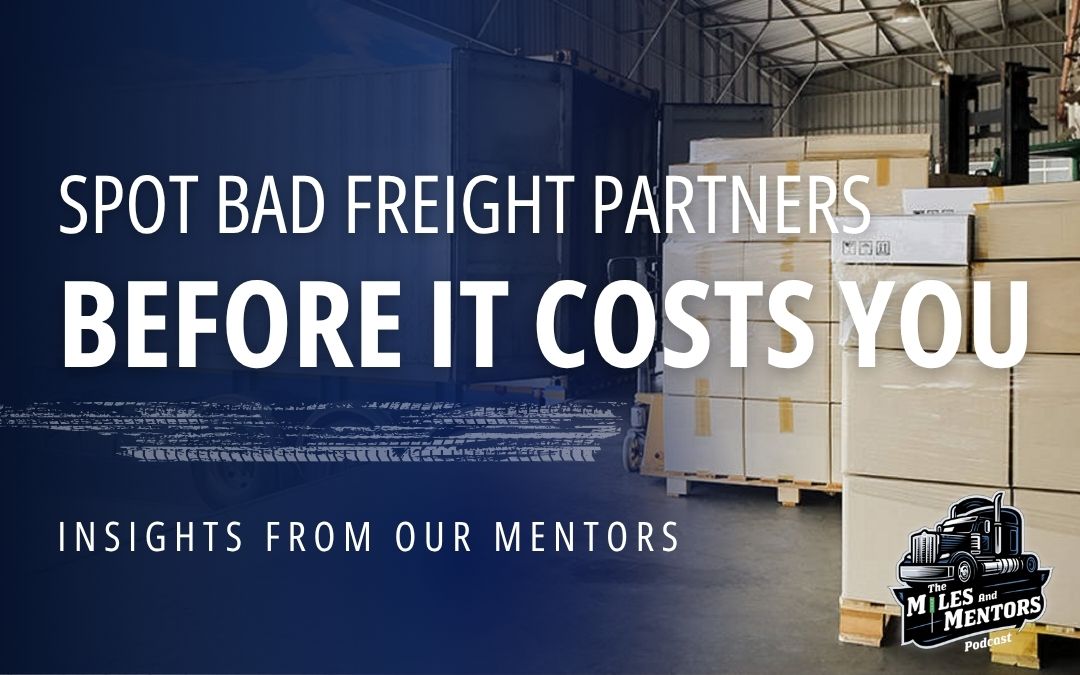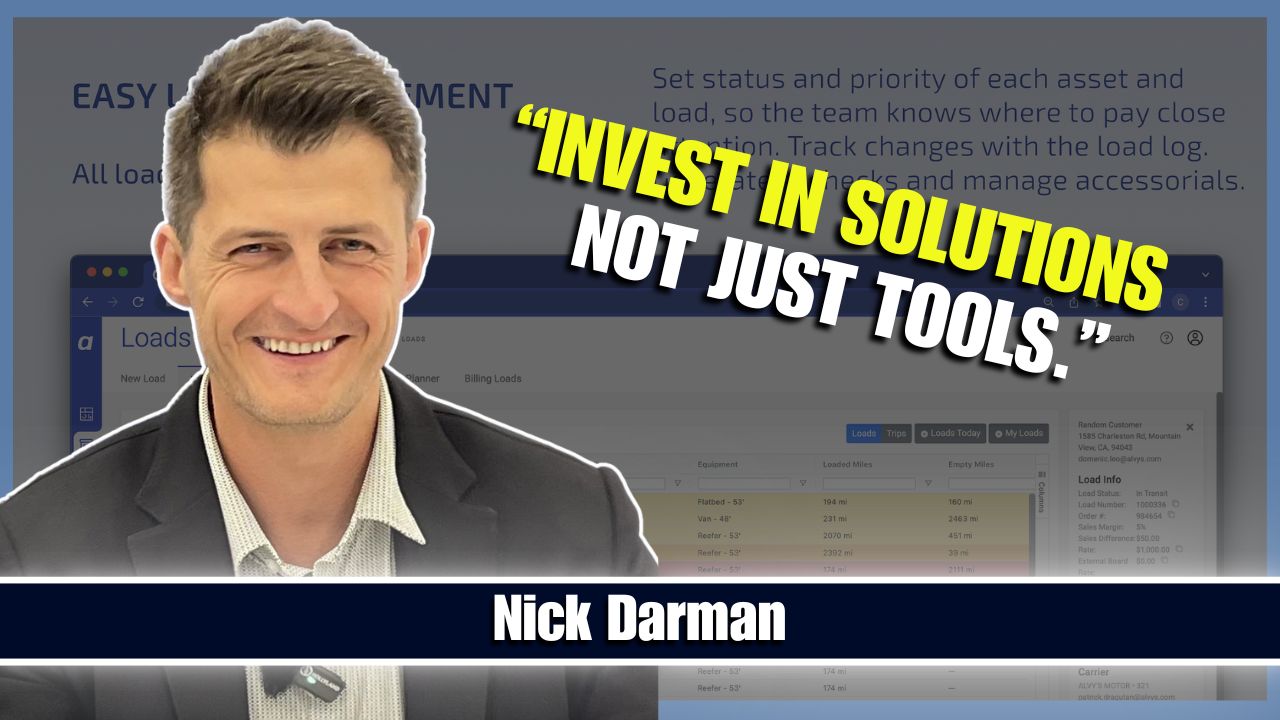Choosing the right freight partner directly impacts your operations, profits, and reputation. While reliable brokers and carriers keep your loads moving, unreliable ones create delays, disputes, and lost revenue. In a market where freight fraud, stolen loads, and double brokering are on the rise, your first defense is strong vetting.
A trustworthy freight partner ensures timely delivery, proper documentation, and transparent communication. They help you meet shipper expectations, protect your margins, and avoid the legal risks tied to noncompliance. On the other hand, a bad partner can trigger a cascade of issues: delayed payments from factoring companies, missed SLAs, and damage to your client relationships.
Whether you’re a new owner-operator or running a fleet, aligning with the right partners sets the tone for your entire business. The cost of one bad relationship can far outweigh the effort it takes to vet and choose wisely. It’s not just about moving freight. It’s about moving your business forward with confidence.
Understanding the Importance of Choosing the Right Freight Partner
The Role of Freight Partners in Supply Chain Management
Freight partners play a vital role in ensuring smooth and reliable transportation. They are responsible for coordinating shipments between shippers and carriers, maintaining schedules, and upholding service expectations. A dependable partner contributes to consistent delivery performance and helps avoid costly delays or disruptions.
In a competitive logistics environment, freight partners directly influence your customer relationships and profit margins. When shipments run smoothly, trust builds. When they don’t, problems ripple across your entire operation.
Reliable partners bring structure to your supply chain. They communicate clearly, provide accurate documentation, and act quickly when problems arise. Whether you’re running a single truck or managing a fleet, having trustworthy brokers or carriers keeps your operation focused and efficient.
Choosing the right freight partner is not just about capacity. It’s about finding someone who values accountability, follows through on commitments, and supports your long-term goals.
Consequences of Working with Unreliable Carriers or Brokers
Working with unreliable carriers or brokers can create immediate and lasting damage. Missed pickups, late deliveries, and communication failures frustrate customers and damage your brand. Financially, the impact can be severe, including lost revenue, penalties, and increased costs from resolving service failures. In some cases, freight may be stolen or rebrokered without consent, exposing you to legal risk. These partners may also provide false documentation or disappear when issues arise. Over time, repeated problems erode trust with clients and partners, making it harder to secure quality freight or maintain steady business growth.
The Impact of Poor Freight Partnerships on Business Reputation and Finances
A poor freight partner can create a ripple effect that damages your entire operation. Missed shipments and service disruptions harm your credibility with customers, leading to lost contracts and reduced referrals. Financially, the consequences may include chargebacks, increased insurance premiums, and delayed payments due to missing documentation like the Bill of Lading. Inconsistent service forces you to spend more time and money fixing problems instead of growing your business. For smaller operations, one bad partner can strain cash flow and cause long-term setbacks that are difficult to recover from.
Key Red Flags to Watch For
Lack of Transparency in Pricing and Services
Freight partners who cannot provide a clear, detailed explanation of their pricing model should be approached with caution. Hidden fees, vague rate structures, and unexpected charges can quickly erode trust. Be wary of partners who do not disclose fuel surcharges, detention fees, or additional accessorial costs upfront. Missing or inconsistent documentation, like a Bill of Lading without clear shipper details, is another warning sign. Transparency is essential for building reliable partnerships. If a broker or carrier is hesitant to share their terms or avoids direct questions, it’s a signal that they may not operate ethically or consistently.
Poor Communication and Responsiveness
Freight partners who disappear when problems arise or fail to confirm shipment changes place your entire operation in jeopardy. Frequent unresponsiveness is a hallmark of unreliable brokers. These issues create unnecessary logistics risks. Missed updates can lead to delayed pickups, lost revenue, and broken commitments with customers. A trustworthy freight partner should provide proactive updates, respond quickly to concerns, and handle problems with clarity. When you encounter repeated lapses in communication, it’s a clear sign the partner lacks professionalism and reliability. Inconsistent communication can unravel your schedule and damage your relationships with both shippers and carriers.
Inconsistent Delivery Times and Service Reliability
When missed pickups, late deliveries, or unexplained absences become the norm rather than the exception, it is clear the carrier is not reliable. These inconsistencies hurt your business and frustrate your customers. Over time, repeated failures in performance can result in canceled contracts, penalties, and poor customer retention. Dependability is essential in the freight world where every hour counts. A carrier or broker who cannot consistently meet service commitments becomes a liability. Track performance trends and hold partners accountable. Reliable service is a baseline expectation, not a bonus. Without it, your trucking business is exposed to unnecessary logistics risks.
Evaluating Carrier and Broker Credentials
Importance of Checking Licenses and Insurance
Before working with any partner, verify their MC number and DOT number using FMCSA records. In the United States, all freight brokers and carriers must maintain active authority and up-to-date insurance documentation. Confirm they have appropriate freight broker authority, up-to-date cargo insurance, and adequate liability insurance to protect your freight. This step is non-negotiable in safeguarding your operations. Insurance verification should include checking policy expiration dates and coverage types. Inaccurate or expired documentation is a major red flag. Brokers operating without valid credentials are not only breaking the law but putting your freight at risk.
How to Verify Industry Certifications and Memberships
Membership in vetted industry networks or participation in events such as the Freight Broker Summit can signal a partner’s commitment to professional standards. Always ask for proof. Additionally, a reliable freight partner will be transparent about industry affiliations. Industry-specific memberships, such as the Transportation Intermediaries Association (TIA), indicate a serious commitment to ethics and continued freight broker training. Certifications and active participation in logistics events also show an effort to stay informed about evolving industry standards.
Assessing the Financial Stability of Potential Partners
Use credit checks and feedback from factoring companies or platforms like Carrier411 to assess financial health. Consistent complaints, late payments, or rejected applications are all serious warning signs. Financial instability is often overlooked during broker vetting, but it should be a priority. Unstable brokers may delay payments, cancel loads last minute, or leave you with unpaid invoices. Regularly evaluating your partners’ financial standing helps protect your cash flow and ensures that you’re working with dependable businesses.
Analyzing Customer Reviews and Testimonials
Where to Find Reliable Reviews and Ratings
You can learn a great deal from reviews on DAT, Truckstop, or even driver forums like Reddit’s r/Truckers. These platforms host feedback from carriers and shippers who have dealt directly with freight brokers and dispatchers. Pay close attention to patterns involving payment fraud, ghosting, or constant miscommunication. Social proof plays a critical role in broker vetting, especially when working with new or unfamiliar partners. Factoring companies and freight industry technology tools may also provide rating systems or performance history, which should be used to verify consistency.
Red Flags in Customer Feedback to Consider
Statements like “no one answered the phone,” “they changed the quote after booking,” or “they rebrokered our load without permission” should not be ignored. These are common indicators of trouble. Other warning signs include unexpected accessorial charges, vague explanations for delays, and unverified contact information. Watch for recurring mentions of invoice disputes or issues tied to cargo insurance claims. Bad reviews may not always reflect a broker’s current performance, but repetitive patterns across platforms demand attention.
The Value of Case Studies and Success Stories
Established companies usually provide client success stories or named testimonials. If you cannot find any detailed case studies or referrals, ask for them. If they are reluctant or evasive, that itself is a red flag. Success stories that name clients and describe the challenge and result in detail add credibility and transparency. Strong testimonials signal a history of performance and accountability, which is essential when building your freight business around reliable freight partners.
Conducting Thorough Background Checks
Steps to Perform a Background Check on Freight Partners
Begin by confirming their MC and DOT numbers are active and registered. Then check their safety scores and CSA ratings. Review their insurance policies carefully, paying attention to expiration dates and any exclusions. These steps are essential in both carrier vetting and broker vetting processes.
Utilizing Industry Databases and Resources
Tools like Carrier411, FMCSA portals, and state registration databases offer critical data on compliance and operating history. You should also use freight industry technology solutions to verify credentials and operational integrity. New carriers often make avoidable mistakes due to lack of awareness of these tools.
Importance of Seeking References from Past Clients
Do not hesitate to ask for two or three recent references. Reach out and verify the quality of the relationship. This direct feedback can reveal issues not visible through documentation alone. It also plays a key role in reputation management.
Tech and Tools to Identify Risk
Modern tools can catch red flags early. Some load boards will alert you to suspicious MC numbers or signs of double brokering. AI-driven fraud prevention software can flag mismatches between emails, phone numbers, or addresses. Other tools help validate key documents such as the Bill of Lading, rate confirmations, or insurance certificates. Leveraging freight industry technology is increasingly necessary to stay ahead.
Contracts, Insurance, and Freight Fraud Prevention
Effective contracts should include language that clearly defines liability, payment terms, and coverage. Insist on having cargo insurance and liability insurance certificates listing your business as a certificate holder. Always confirm that those documents are current and properly filed. If your freight disappears or is involved in freight fraud, having clear documentation and insurance coverage makes it much easier to resolve. Fraud in the trucking industry is on the rise and a solid contract is one of your best defenses.
Ready to Protect Your Business from Bad Freight Partners?
Do not wait until you lose a shipment or miss payroll due to unpaid invoices. Whether you’re an owner-operator or managing a growing fleet, the tools and insights above can help you avoid common new carrier mistakes, dispatch service risks, and broader trucking industry fraud. If you are unsure where to start, consult a mentor or reach out to professionals who understand the real threats in the transportation industry. Your long-term success in the trucking business depends on working with trustworthy freight partners and avoiding unreliable brokers.



